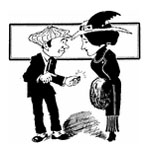
Idealism
HARVARD DIARY
During the early 1960s, I often heard the concerns of Southern civil rights activists as they contemplated one or another assault on segregationist power. They wanted and needed recruits — black and white youths able and willing to take the risks of police brutality, even imprisonment — and they sought those recruits actively on campuses within and outside the region.
Yet, sometimes there were second thoughts, as given voice in this instance by a black man of 24 who had been working in the “movement” for several years: “I don’t know these white college kids. I’ve lived all my life here in the South, and most of them come from the North. They’re from New England and New York; they’re from Chicago and St. Louis and Cleveland; and they’re from the West Coast. They’re strangers to Alabama and Georgia and Mississippi. Lots of them have been to Europe once or twice, but never here. They want to help us out, and that’s great. But every once in a while I take a look at them and wonder who they really are, and what’s pushed them to us — to come down to our Dixie and tell us they want to help, and they know they might get hurt, hurt bad, even risk getting killed.
“I know the answer. They’re good people. They want to change the world. They’re idealists. I guess I should let the matter drop, right there. I shouldn’t be suspicious. I should be grateful. But I still can’t help wondering about them. Maybe it’s because they’re white and I’m a Southern ‘colored boy’ — when I’m not a ‘nigger’! Maybe it’s me — never trusting any white man, no matter who he is. And that brings up something else — the white women who come here: I’m even more suspicious of them. I just can’t help it! I wasn’t brought up to see white women be so comfortable with Negro people, especially Negro men — comfortable on an equal basis, not comfortable in ordering us around. I wasn’t brought up to see white folks ready to help us, and share our troubles. I guess I don’t have as much faith in human nature as I thought I did! I guess I’ve become cynical — or have never had any reason not to be cynical. These days I look at these white folks down here to help us, and I say to myself that they seem as good and unselfish and helpful as you could ever want — and then I catch myself wondering if they don’t have something up their sleeves. You could say I’m wondering what their motives are. What’s the phrase — ‘ulterior motives’? Then I feel ashamed of myself — when one of them comes in beaten up by a sheriff’s stick!”
You May Also Enjoy
How are we to protect our children from an entire culture become in so many instances obsessively, coyly, or blatantly pornographic?
Our morally bankrupt political leaders lie for a living and call it the “fact-checked” truth.
If interreligious connectedness is not recognized and cherished at a time when religion itself is imperiled, we are in a bad way.

